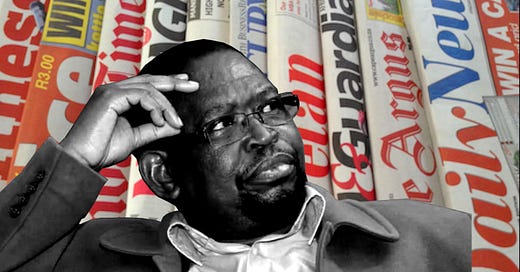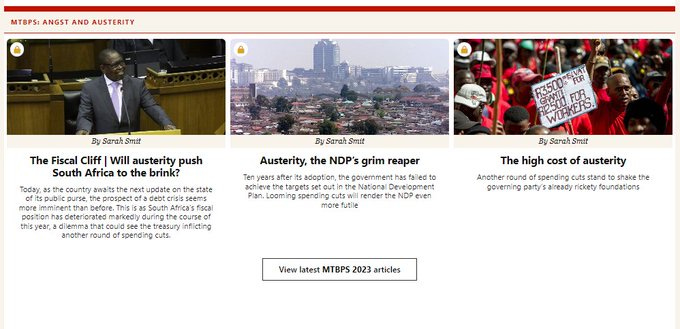The Mail & Guardian’s fiscal analysis: “Money don’t real”
The dangers of "austerity" are a shibboleth for the reality-deprived
With the new state budget hitting the gazette this week, the papers have reacted with alacrity to demonstrate their economic illiteracy. The Mail & Guardian now has a dedicated category on their website for the topic of “MTBPS: Angst and Austerity”, consisting entirely of articles by Sarah Smit who cries that the people of this country will all starve to death and the economy will evaporate overnight if we don’t run the money printers at full blast and liquidate the middle and upper classes’ assets.
Okay, that’s a clear exaggeration, but the very use of the term “austerity” should set off alarm bells for any sensible person hearing it. Austerity is a fancy word for cutting or freezing the budget. What that means, is that if austerity is a dirty word, the only permissible policy is the indefinite increase of the state budget, every fiscal cycle, forever.
Now that we are facing a serious fiscal cliff, with regular expenditures and public debt outgrowing revenues and economic growth, we will either have to freeze spending and increase revenue, or cut spending, and drastically.
But the old Mugg & Goon has other ideas. Here’s yet another article of theirs issuing the same widows-and-orphans emotional blackmail to persuade you that we need never cut the budget, and can spend like Zimbabwe is a fictional bogeyman: by fancypants economiser Duma Gqubule.
Mind you, it isn’t as if the government have their heads screwed on tightly either. The following statements made for an interesting juxtaposition of headlines:
Finance Minister has big plans to cut runaway spending (Daily Investor)
SA must hike borrowing or go over fiscal cliff by March 2024, warns Godongwana (IOL)
Such jarring performative contradictions show just how far along we are on the old Zimbabwefication train – as those of you with a vague recall of their administrative history will remember, the first decade of ZANU-PF government, while a violent and ramshackle affair, gave the country free education and healthcare, and many new free services.
Of course, spending got out of hand, and they had to borrow money and restructure the economy. Then the pushback happened, and they had to print money to cover debts, corrupt patronage and public welfare, and the 90s were spent with double-digit inflation, before the state decided to fully cannibalise the country and its currency, and nick all the white fellas’ farms.
That said, I don’t think the government are entirely ignorant of their predictions. Several times in the past few years, the state has tried to reign in welfare spending, patronage and salaries, but protests, violent political infighting and instability, and the strength of the public sector unions have prevented any of these leaks from being plugged.
Godongwana, in between waves of emetic platitudes about the effects of covid and the need to address inequality and the old apartheid legacy, managed to sum up the actual challenges fairly concisely:
The IMF's global growth forecast for 2023 was revised down from 3.8% to 2.7%, and the real GDP growth of 1.9% in 2022.
The budget will cover some flood damage, add to critical infrastructure, and feed free services (and a little tender fraud along the way, we can safely assume), and promises to cut the fiscal deficit to 4.9% of GDP in 2022/23, and 3.2% by 2025/26, with Gross government debt expected to stabilize at 71.4% of GDP in 2022/23.
Consolidated government spending will exceed R2.2 trillion this year and rise to R2.5 trillion in 2025/26 (whew), but fortunately, revenue collection was bigger than projected, with the gross tax revenue estimate for 2022/23 revised up by R83.5 billion to R1.68 trillion, and so they allocated a net addition of R13 billion in spending adjustments for the 2022/23 financial year, instead of taking the opportunity to deflate that big bag of national debt.
For all those sick and sclerotic state-owned enterprises, good news: more money! Denel, Transnet, and SANRAL will get packets to help restructure, rebrand, and pay off their colossal debts. Much of Eskom's R400 billion debt is being covered by the taxpayer too (though he didn’t mention the loan taken out with the Chinese at the BRICS conference to cover this).
New procurement regulations are promised, which we are assured will curb wasteful and corrupt expenditures, and SAPS and the rest of the justice system will be taking on several thousand new employees.
All of this must be taken with the following pinch of salt – that predicted outcomes have been rosier every year than even the cooked books delivered when the accounts were finally done. Long term, we can all see performances have been pretty terrible.
South Africa's economic performance since its transition to democracy in 1994 has been dismal, and the extremely generous welfare system (relative to other middle-income countries anyway) has done nothing to encourage economic growth (quite the opposite, if common sense is any indicator).
GDP per capita has increased by only 22% from 1994 to 2022, while countries like China, Vietnam, Ethiopia, India, and Poland have seen much more significant growth, an order of magnitude more, in fact, according to the World Bank. South Africa's GDP per capita in 2022 was lower than it was in 2007, and it is expected to continue declining for the next three years, resulting in 18 years of decreasing living standards. The country faces record levels of unemployment, poverty, and inequality.
We currently hold the world's highest unemployment rate, with 11.9 million people unemployed and an unemployment rate of 42.4% in the second quarter of 2023. Approximately half of the population lives in poverty, and one in five people lacks adequate access to food. Furthermore, it is the most unequal country globally, with the top 10% earning 67% of incomes and owning 86% of the wealth. That’s a significant increase from the old regime, under whose iron fist, inequality actually decreased (not that one should trust GINI coefficient scores too much).
According to the M&G (among others), the core issue is that the treasury and the Reserve Bank are primarily focused on debt and inflation (i.e., their actual constitutional purview), rather than addressing the pressing issues of unemployment, poverty, and inequality. Imagine that – they could just be hosing pedestrians down with freshly printed Rands every day and twice on weekends.
These guys tend to accuse the Minister of exaggerating the fiscal crisis for political reasons. Gqubula made this point himself, and the quoted figures which undermined his point entirely: the left-wing Institute for Economic Justice (IEJ) forecasts a budget deficit of 6.3% of GDP, while the 2023 budget had projected a deficit of 3.9% of GDP.
Most blame this on revenue shortfalls, and say we need to squeeze the taxpayer some more. Of course, other analysts have been arguing that we are on the verge of a tax revolt, because the margins are to steep for a middle class that would barely qualify as working class in the West.
Add to this the fact that the only seriously vibrant sector of the economy outside the Western Cape is the informal sector, which doesn’t pay taxes, and you have before you a stone from which no blood can be drawn.
Again and again, we see that old tokoloshe “neoliberalism” blamed for all of this.
But perhaps we should be thankful for that lingering “neoliberal” element in our socialist political economy – despite all the political incentive to do so, the government has resisted printing money with the aggressive fervour of Zimbabwe, or even the recent policies of the Western world post-covid.
Our inflation remains in single digits, and we still have a tradeable currency, as motheaten as the old thing has become.
Of course, this cannot last. The fiscal cliff is real for the very simple reason that spending is not being cut, debt servicing costs are going up, revenues are maxed out, and economic growth is relatively flat. “Austerity” must come, because if experience is any indicator, when pigs fall off a cliff, they tend not to fly very far.




